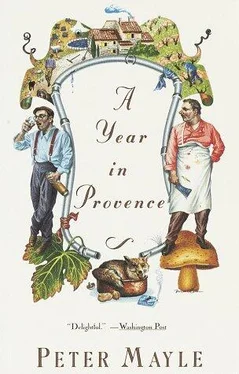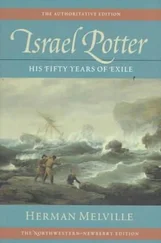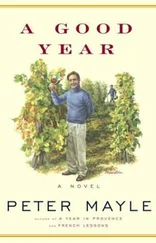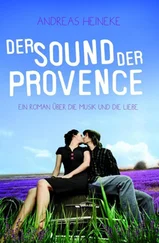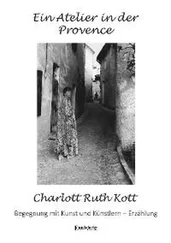Peter Mayle - A Year In Provence
Здесь есть возможность читать онлайн «Peter Mayle - A Year In Provence» весь текст электронной книги совершенно бесплатно (целиком полную версию без сокращений). В некоторых случаях можно слушать аудио, скачать через торрент в формате fb2 и присутствует краткое содержание. Жанр: Современная проза, на английском языке. Описание произведения, (предисловие) а так же отзывы посетителей доступны на портале библиотеки ЛибКат.
- Название:A Year In Provence
- Автор:
- Жанр:
- Год:неизвестен
- ISBN:нет данных
- Рейтинг книги:4.5 / 5. Голосов: 2
-
Избранное:Добавить в избранное
- Отзывы:
-
Ваша оценка:
A Year In Provence: краткое содержание, описание и аннотация
Предлагаем к чтению аннотацию, описание, краткое содержание или предисловие (зависит от того, что написал сам автор книги «A Year In Provence»). Если вы не нашли необходимую информацию о книге — напишите в комментариях, мы постараемся отыскать её.
Who hasn't dreamed, on a mundane Monday or frowzy Friday, of chucking it all in and packing off to the south of France? Provençal cookbooks and guidebooks entice with provocatively fresh salads and azure skies, but is it really all Côtes-du-Rhône and fleur-de-lis? Author Peter Mayle answers that question with wit, warmth, and wicked candor in A Year in Provence, the chronicle of his own foray into Provençal domesticity.
Beginning, appropriately enough, on New Year's Day with a divine luncheon in a quaint restaurant, Mayle sets the scene and pits his British sensibilities against it. "We had talked about it during the long gray winters and the damp green summers," he writes, "looked with an addict's longing at photographs of village markets and vineyards, dreamed of being woken up by the sun slanting through the bedroom window." He describes in loving detail the charming, 200-year-old farmhouse at the base of the Lubéron Mountains, its thick stone walls and well-tended vines, its wine cave and wells, its shade trees and swimming pool-its lack of central heating. Indeed, not 10 pages into the book, reality comes crashing into conflict with the idyll when the Mistral, that frigid wind that ravages the Rhône valley in winter, cracks the pipes, rips tiles from the roof, and tears a window from its hinges. And that's just January.
In prose that skips along lightly, Mayle records the highlights of each month, from the aberration of snow in February and the algae-filled swimming pool of March through the tourist invasions and unpredictable renovations of the summer months to a quiet Christmas alone. Throughout the book, he paints colorful portraits of his neighbors, the Provençaux grocers and butchers and farmers who amuse, confuse, and befuddle him at every turn. A Year in Provence is part memoir, part homeowner's manual, part travelogue, and all charming fun. – L.A. Smith
From Publishers Weekly
An account of the author's first frustrating but enlightening year in Provence opens with a memorable New Year's lunch and closes with an impromptu Christmas dinner. "In nimble prose, Mayle… captures the humorous aspects of visits to markets, vineyards and goat races, and hunting for mushrooms," said PW.
***
One of my favorite books by one of my favorite authors, A Year in Provence is a light-hearted autobiography as well as a travel/restaurant guide and cultural study of the south of France. Peter Mayle, once a British businessman, has finally chucked it all and bought a house in Provence with his wife and two dogs. He recounts a year of their adventures living and working amid the French, including daily struggles with the strong Provençal accent, the nosiness of neighbors, and the self-proclaimed experts on everything from geophysics to truffle hunting. His humorous yet affectionate approach will make you long for France, particularly the south, whether or not you've ever been there.
You won't be able to stop laughing when you read about the author's discovery of French bureaucracy and the bone-chilling winter wind called the Mistral, his desperate tactical maneuvering to get his house remodeled, and the hordes of rude tourists. You'll be tickled by his observations of French greetings and body language. You'll love his French neighbors and hate his English friends. And you will be starving after reading his mouth-watering descriptions of dozens of restaurants and dinner parties.
Whether you are interested in learning more about French, "the Hexagon," or cuisine française, A Year in Provence is the book to get you started on your cultural discovery of the south of France. The best discovery of all is that Peter Mayle continues to write about Provence, both non-fiction and novels. You will definitely want to seek out all of his books and continue learning about the people, traditions, and food of southern France.
Laura K. Lawless
